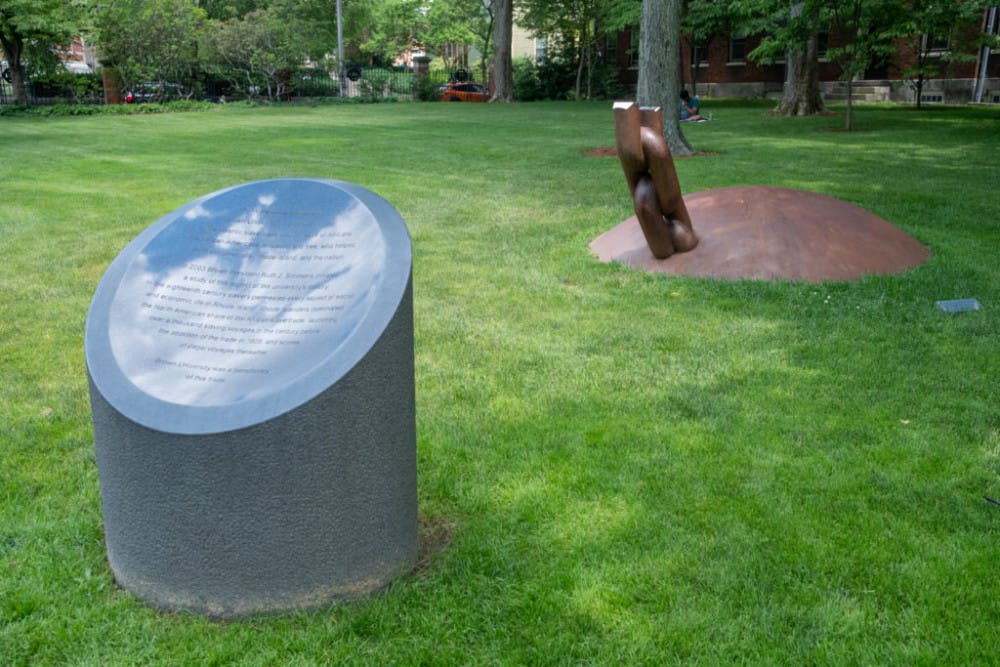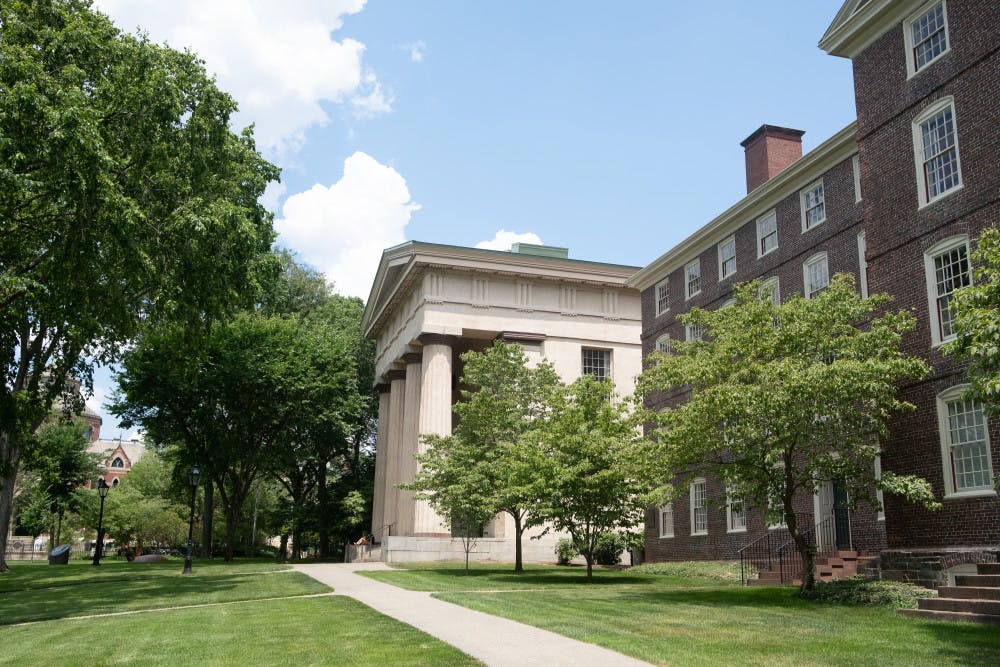When Juliet Hooker, a professor of political science, began teaching her class POLS 1530: Gender, Slavery, and Freedom a few years ago, she was surprised to learn just how little some students in her classroom knew of the University’s ties to chattel slavery.
Some were unaware of the Slavery Memorial on campus. Others had never read or had no comprehensive knowledge of the Report of the Brown University Steering Committee on Slavery and Justice.
When Hooker learned that Brown’s administration would recognize Juneteenth as a paid day off for University employees this year— which was announced by President Christina Paxson P’19 in a community-wide email June 15 — she was reminded of this lack of awareness.
Hooker, who is Black and grew up on the Caribbean coast of Nicaragua before moving to the United States, hopes efforts such as the commemoration of Juneteenth will be accompanied by “deeper engagement with the history of white supremacy” at Brown, in Rhode Island and beyond, “and with attempts to confront that history honestly.”
Juneteenth, an annual holiday celebrated on June 19, commemorates the arrival of the news of emancipation. Until recently, it was not widely recognized outside of Black Southern communities. The holiday, one week ago today, drew far-reaching attention this year as protests over police brutality and anti-Black racism persist across the country.
This year marked the first time Juneteenth was recognized as a paid University day off.
Over the past week, five Black faculty and staff spoke to The Herald about what that announcement — and Juneteenth, itself — means to them.
Marco McWilliams, program coordinator and educator for the Engaged Black History and Justice Scholars Program at the Swearer Center, spent the day marching, rallying and speaking. He also spent the day in historical study and a state of reflection.
“This Juneteenth,” McWilliams told The Herald, “was about the contemporary politics of Black liberation.”
Last Friday, under the afternoon sun, in a black T-shirt which read “Abolish White Supremacy,” he stood tall on the steps of the Rhode Island State House.
He recounted to the crowd of hundreds what had happened on that day 155 years ago, June 19, 1865, when enslaved African-Americans in Galveston, Texas, learned from Union soldiers that they were free — more than two years after Abraham Lincoln signed the Emancipation Proclamation.
“But true freedom is what you go get yourself,” McWilliams continued to thunderous applause from the hundreds of community members who had gathered for the youth-led Juneteenth rally. “That is liberation.”
Though there is the possibility of a permanent, annual commemoration of Juneteenth by the University “to be considered for the years ahead,” Paxson’s announcement pertained only to 2020, university spokesperson Brian Clark wrote in an email to The Herald.
“There is a separate process in place to consider any longer-term designations of holidays,” he wrote.
University employees whose obligations required them to report to work on June 19 “should work with their supervisor” to arrange compensatory time off at a later date, according to the announcement.
[caption id="" align="aligncenter" width="650"]

McWilliams — calling the announcement “wholly appropriate” — hopes that the day will continue to be formally marked by the University in years to come.
Jonathan Collins, assistant professor of education, recalls waking up on Juneteenth feeling uneasy. The day is a staunch reminder that chattel slavery occurred and that it occurred not so long ago, he said.
“Especially at this moment,” Collins added, “to celebrate the end of slavery while also being face to face with the effects of anti-Black racism, it makes it a very difficult day to celebrate.”
The viral video of the police killing of George Floyd in Minneapolis and the nationwide reckoning with anti-Black racism that has ensued has opened the eyes of white America to truths that people of color have long known: Police brutality is part of a deeply entrenched code of white supremacy that frames the country’s past and present.
To celebrate Juneteenth “brings forward a sense of pain,” Collins said. “And to reflect on that pain is psychologically intense.”
Paxson wrote in her statement that observing Juneteenth provides “time to reflect on the national climate regarding issues of race, to learn more specifically about anti-Black racism, and to think about what each of us can do individually to promote change.”
Collins, who earlier this month authored an Op-Ed in The Herald entitled, “We Suffocate: When Will We Finally Breathe?” appreciated this framing. He spent his morning reading and reflecting, but said that, by the afternoon, he could not help but begin work again.
“That’s the paradox that we find ourselves in as young Black faculty,” he said. “These opportunities to commemorate are important, but there is still a significant amount of pressure for us to do our jobs and to make sure that we are progressing our scholarly agenda.”
The underrepresentation of Black faculty on Brown’s campus, Collins added, brings with it an obligation to be continuously productive to maintain his place on campus. “It’s a pressure that I very much feel every day.”
While not a federal holiday, Juneteenth is currently recognized in all but three states and has been a state holiday in Rhode Island since 2012.
A slate of other schools — among them, Princeton and Harvard — announced similar measures to Brown in recent weeks, including paid time off for all staff and faculty in observance of Juneteenth.
When Shawn Daily, a recruiting coordinator for University human resources, saw the Juneteenth announcement from Paxson, he felt seen and heard. “It was really cool to see the place you work for showing support for you and your people,” he said.
For Daily, who grew up in New York, Juneteenth was neither part of his family life, nor was it included in his school curriculum. It wasn’t until he took an African Diaspora Studies class in college that he learned about Juneteenth. “Then I was able to get a better grip on my background, my history and some of my ancestor’s' history,” he added.
Juneteenth felt all the more poignant this year for Assistant Professor of Emergency Medicine and Pediatrics Alicia Genisca, as she and her colleagues have been straining to meet the challenges of the coronavirus — which is disproportionately affecting Black patients and other patients of color — for months.
In the hospital ward, day in and day out, “we’re seeing how these racial inequalities play out on a day-to-day basis,” Genisca, who is also a pediatric emergency medicine physician at Hasbro Children’s Hospital, said.
Pleasantly surprised by the University’s announcement, Genisca spent the day in reflection and learning.
“I’m a first-generation American,” as the daughter of Haitian and Jamacian immigrants, Genisca added. “So this is completely new to me.”
For Hooker, the holiday marks not just pain and struggle, but strength and hope.
“One of the important things about Juneteenth,” she said, “is that it reminds us of Black agency and persistence.”
The University’s recognition of Juneteenth was a step in the right direction, Hooker added, but she hopes that it “will be accompanied by more steps.”
The road ahead, she knows, is long.
Correction: An earlier version of this article misspelled the name of Jonathan Collins, assistant professor of education. The Herald regrets the error.





